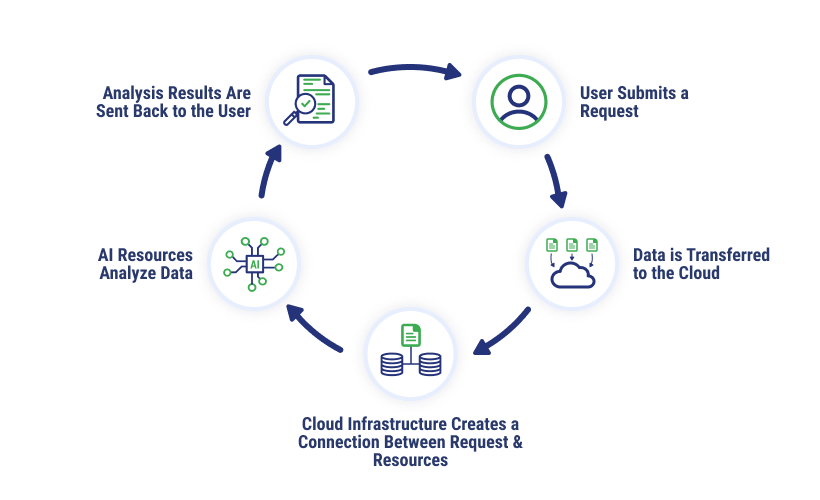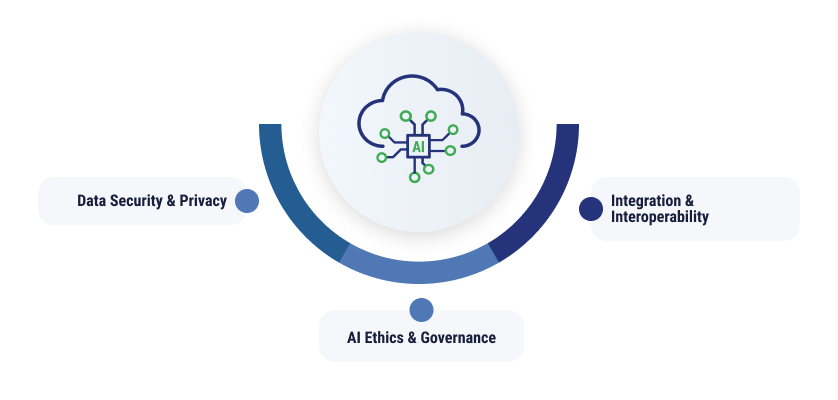
As IT environments continue to become more complex, IT leaders face many challenges. Data volumes are rapidly expanding, ransomware poses an ever-evolving threat, and businesses are forced to constantly compete in an increasingly crowded marketplace. Long gone are the days of immediate geographical competition. Customers now expect user-friendly, tech-savvy experiences from businesses in all different industries, and they have the luxury to shop around. With AI here to stay, these advantages of cloud-based AI could be the answer to these challenges.
Understanding Cloud-Based AI
Cloud-based AI, also known as AI as a Service (AIaaS) or AI Cloud, represents the intersection of artificial intelligence and cloud computing. With AI Cloud, businesses can leverage AI tools and capabilities in the cloud without the need for significant investments in development or maintaining additional hardware.
Cloud computing allows for on-demand access to computing resources without the need for investing in physical infrastructure. Cloud-based AI further expands these capabilities by providing access to machine learning, natural language processing, predictive analytics, and more within a convenient cloud environment.
How Does Cloud-Based AI Work?
By taking advantage of cloud-based AI, it will seamlessly integrate artificial intelligence tools and resources into cloud infrastructure. The process begins with a user request, which could involve generating content, identifying an image or face, applying a rule based on preset criteria, or other AI tasks. Subsequently, the necessary data for executing the AI task is transferred from the user’s device to the cloud.
The cloud infrastructure processes the data, establishing the connection between the user’s request and the appropriate resources to handle it. The AI resources then analyze the data using relevant technologies. Subsequently, the results are sent back to the user. The key distinction between cloud-based AI and other AI implementations lies in the hosting location—cloud-based AI operates within the cloud environment.

11 Advantages of Cloud-Based AI
The advantages of cloud-based Ai can empower businesses to form rapid-fire insights, personalize the user experience, collaborate more effectively, and innovate more quickly to gain a competitive edge. Stay agile, competitive and responsive with the following advantages of cloud-based AI:
Rapid Analysis and Deeper Insights
Connecting disparate data sets can be challenging, hindering the ability to glean meaningful insights. Cloud-based AI addresses this by facilitating seamless data integration and enabling rapid analysis.
With the power of AI, businesses can efficiently process vast amounts of data, identifying trends and patterns that might otherwise go unnoticed. This not only enables real-time decision-making but also empowers organizations to anticipate future needs based on historical data, providing deeper and more actionable insights.
Cost Effectiveness and Resource Optimization
Traditional on-premises hardware and software solutions often entail significant upfront costs, not to mention the ongoing expenses for maintenance, upgrades, and scalability. Additionally, AI tools typically demand substantial computational resources, further escalating costs.
Cloud-based AI offers a more cost-effective alternative by eliminating the need for large, one-time CapEx investments in hardware and software. With cloud computing, businesses can access AI resources on a pay-as-you-go basis, scaling resources up or down based on demand. This not only optimizes resource utilization but also allows organizations to allocate financial resources more efficiently, ensuring they only pay for the AI services and resources they actually use.
Automated Operations
The combination of AI and cloud computing offers a powerful synergy for automating operations and streamlining repetitive, manual tasks. AI algorithms can be trained to create rules and adapt to new inputs, enabling automated processes that minimize human intervention.
By leveraging AI-driven automation in the cloud, businesses can significantly reduce human errors and enhance productivity.
Scalability and Agility
Public cloud environments offer unparalleled scalability compared to traditional on-site data centers. Businesses that employ public cloud computing can size resources up or down based on needs almost instantaneously. This helps protect organizations against overpaying for resources they don’t need. When it comes to AI, where computational requirements can be substantial, scalability is a necessity.
Easy Access to AI/ML Tools
Legacy infrastructure can often be restrictive and challenging to integrate with modern AI and ML tools. In contrast, cloud computing offers a seamless connection to a wide range of AI and ML resources, enabling businesses to leverage advanced technologies without the constraints of outdated systems.
Platforms like Azure and AWS further simplify access to AI/ML tools by offering built-in services and tools that can be easily integrated into existing workflows. These cloud providers provide a comprehensive suite of AI and ML services, from data analytics and machine learning to natural language processing and computer vision, empowering organizations to innovate and drive digital transformation more effectively.
Monitoring and Security
Cloud providers offer robust security features designed to safeguard data both at rest and during processing.
Additionally, AI-powered cloud services enhance security by proactively identifying and mitigating potential risks. Through continuous monitoring and machine learning algorithms, these services can adapt and evolve to detect new and emerging threats, thereby strengthening the overall security posture of organizations. By combining the scalability and flexibility of cloud computing with the intelligence of AI, businesses can achieve a higher level of security while maintaining operational efficiency.
Data Management
Data access, organization, and storage can be more efficient with cloud-based infrastructure compared to on-premises data centers. Cloud computing can help businesses aggregate and integrate data from different sources, organize it through automated rules, and provide elastic storage options.
Accessibility and Collaboration
Migration to cloud-based AI solutions can usher in new opportunities for accessibility and collaboration for businesses, making it simple for team members to access business-essential applications from any device. Cloud-based AI tools, such as predictive analytics tools and generative AI, can help teams brainstorm, coordinate, and reach decisions more quickly than ever before.
Personalized Experiences
Artificial intelligence can take user preferences and behaviors and use these inputs to create a tailor-made experience. User satisfaction can increase because people are receiving content most likely to resonate with them. This data can also improve the effectiveness of marketing campaigns and the customer service process, leading to more new customers and increased loyalty.
Powerful Computing Capabilities
Modern tasks, especially AI-based tasks, require significant computing capabilities. High-performance computing can perform complex calculations at intense speeds and use GPUs (graphical processing units) instead of CPUs (central processing units). Enabling high-performance computing can be resource-intensive and expensive for businesses. Cloud platforms deployed in high-density colocation facilities allow businesses to take advantage of these capacities without the high upfront investment.
Numerous Use Cases
The applications for cloud-based AI are still in their infancy. Organizations can benefit from predictive maintenance, real-time alerts, intelligent forecasting, automated personalization, optimized supply chains, and more. Use cases for cloud-based AI are sure to grow in the years to come.
Applications of AI in Cloud Computing
Cloud providers, including AWS and Azure, have many different ready-made AI services businesses can use to augment their operations, insights, and customer experience.
With AWS AI services, organizations can perform tasks such as the following:
- Extract text and data from documents
- Perform quality control and augment human capacity during the review process
- Bring lifelike speech to text
- Create personalized applications and user experiences using machine learning
- Find anomalies in data sets and get to the root cause more quickly
- Review code automatically
- Create end-to-end prediction models
- Analyze health data
AWS ML services can enable businesses to:
- Create generative AI applications
- Incorporate AI into existing business applications
- Develop, train, and deploy ML models for a variety of use cases in a cloud environment
Azure AI services can help organizations:
- Bring generative AI applications to market quicker
- Create, train, and tweak AI models based on business data
- Improve safety by finding harmful AI-generated and user-generated content swiftly
- Use foundation models to build AI apps
- Translate documents and text from more than 100 languages in real time
Companies that rely on Internet of Things (IoT) devices, are looking to build chatbots, or want to provide AI as a Service can leverage these AI/ML tools and more in the cloud.
What to Consider Before Adopting Cloud-Based AI
New capabilities can be exciting, but that doesn’t mean they should be taken on without thoughtful consideration of benefits and challenges. Before adopting cloud-based AI, businesses should have a solid understanding of common data privacy concerns, AI ethics and governance considerations, and integration possibilities.

Data Security and Privacy
While cloud providers are responsible for some level of data security, businesses also need to understand what they need to do to safeguard business and user data.
Cyber insecurity was listed as one of the most severe short-term global risks by the World Economic Forum, and it’s also been listed as a risk driver for adverse outcomes of AI technologies. Being aware of the risks associated with cloud computing and AI can better equip businesses to address them.
Cloud providers such as Azure have shared responsibility models that divide tasks between the provider and the customer depending on the type of deployment being used. For example, an IaaS deployment places more responsibility on the customer, whereas a SaaS deployment places more on the provider like Microsoft.
To navigate the complex landscape of data security and privacy in cloud-based AI environments, businesses should develop comprehensive security strategies, implement robust data protection measures, and stay informed about evolving cybersecurity threats and regulations. By doing so, organizations can foster trust, maintain compliance, and mitigate risks associated with data security and privacy, ensuring the safe and responsible use of cloud-based AI technologies.
AI Ethics and Governance
Because AI algorithms are trained by humans, they’re inherently susceptible to biases, which can perpetuate and even amplify over time through iterative training. Achieving complete objectivity in AI algorithms is a challenging endeavor, as they can inadvertently reflect and even exacerbate societal biases present in the training data.
Developers can make AI models better when they have a greater awareness of inherent bias and implement ethical AI practices to combat them.
Integration and Interoperability
While cloud-based AI is a great end-goal, the path to get there may be complicated for some businesses. Legacy frameworks may have dependencies that are difficult to translate in a new cloud environment, and old applications may not integrate well with cloud infrastructures. Before performing cloud migration and before considering cloud-based AI projects, businesses should create a cloud migration strategy and follow or build an AI adoption framework.
Future Cloud-Based AI Trends to Consider
The way businesses operate and interact with customers will look different in the coming years, and much of that is likely to be attributable to AI. Here are some of the trends on the horizon, and how they may continue to shape and grow the AI space.
Ongoing Evolution of Cloud-Based AI
Machine learning and AI are nothing new, but the democratization of AI is. Cloud-based AI has already become more accessible, thanks to services by providers like Azure and AWS. User-friendly interfaces and pre-built tools will make it easier than ever for businesses to leverage AI capabilities without the need for internal specializations.
The greatest short-term global risk, according to the World Economic Forum, is misinformation and disinformation. Much of this stems from what is spread by AI models. As these models become more complex, there will be a greater need for explainability – explanations of how AI arrives at certain decisions. This will be one of the key ways AI models can become more reliable and reduce the amount of disinformation and misinformation being proliferated.
Impact of Edge Computing on Cloud-Based AI Solutions
Edge deployments bring data processing closer to the source of data generation, whether it’s a user device, IoT sensor, or autonomous vehicle. This proximity reduces latency, enhances real-time processing capabilities, and improves the overall efficiency of AI applications deployed in edge environments.
Opportunities for Innovation and Growth
We’ve only just started to see the degree of personalization that AI can provide. Customer interactions in healthcare, retail, and education can become much more specified as AI models learn more from user data and apply it to customized experiences. Businesses will also see further development in automation capabilities, as well as real-time AI-driven decision-making.
Unleash the Potential of Cloud-Based AI
Wherever you are in your cloud or AI journey, it’s always valuable to work with a partner to get you to that next step. Are you at the start of a cloud migration process? Are you trying to figure out how AI can factor into your business processes? TierPoint’s IT advisory consulting can help you identify opportunities for AI/ML tools and services within a cloud computing framework.

